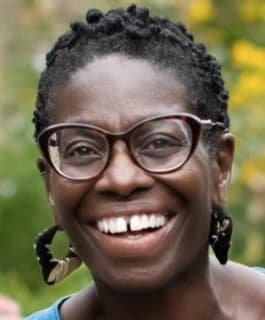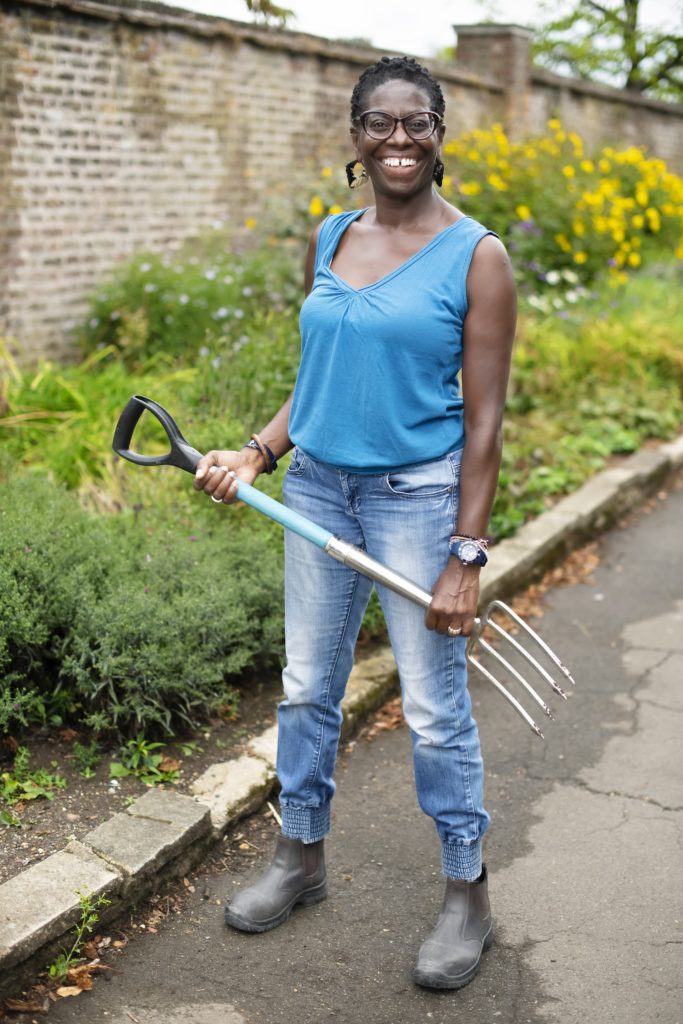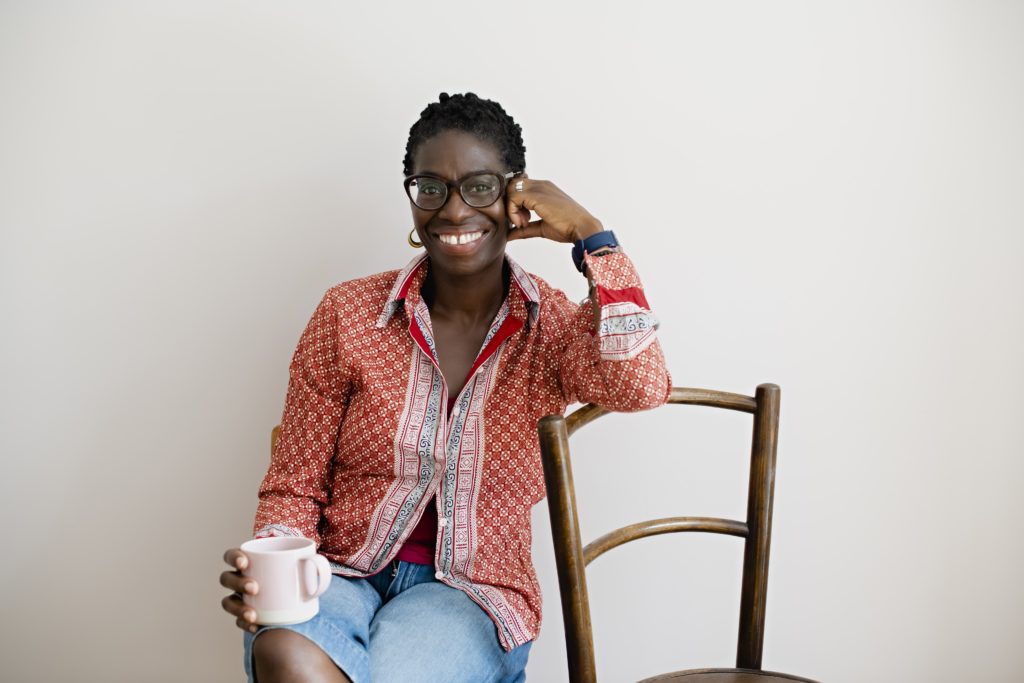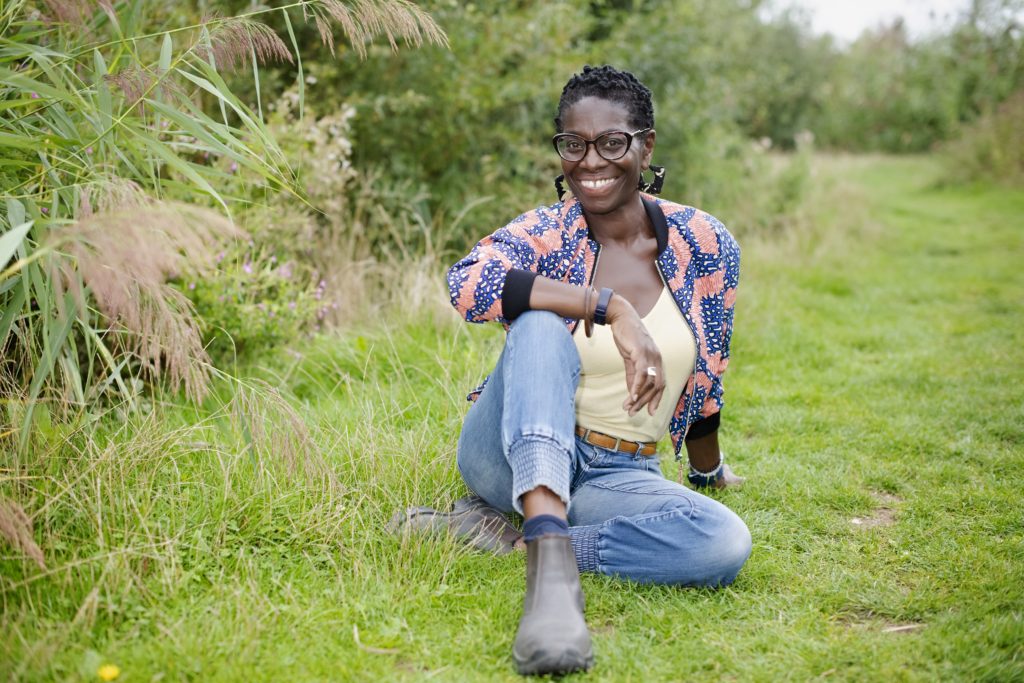TV Presenter Flo Headlam: My Relationship With Gardening And The Wider Community

Contributions From FLO HEADLAM

Flo Headlam is a Garden Designer, Writer & TV Presenter. She is currently a Designer and Presenter on BBC Garden Rescue, having previously worked in the BBC Gardeners' World team. Flo has a Diploma in Garden Design from Capel Manor and has experience working on commercial projects and community gardens.
Flo Headlam is perhaps best known for her work on TV Shows such as Garden Rescue and Gardeners’ World, but her passion for gardening and what it means to the wider community is endless.
With over 10 years of experience working as a Garden Designer, Flo is also a keen community gardener, working in various spaces in the South of England and with organisations such as Coco Collective.
I was lucky enough to get her to speak to Flo and to hear about her career & relationship with gardening in her own words, which you can find in full below.
Please note that the imagery featured in this article is provided courtesy of Jenny Smith.
What Led You To A Career In Garden Design?
“I got to a point where I needed a change in career,” Flo explains. “I’d been working for a charity for almost 14 years and I came back after a second round of maternity leave and thought that it was time to go and do something else.
“At that point, I didn’t know what I wanted to do, I just knew I wanted to be doing something else.
“I had all these skills and didn’t know where to put that focus, so I went to see a life coach, which was really valuable because it gave me the opportunity to think about things.
“She gave me a blank piece of paper and told me to write down everything I wanted to do in my life.
“I started scribbling down answers and when I looked back over it, the first five things I’d written included ‘grow my own produce’ and ‘do some landscaping’.
“I realised after that I was subconsciously going around and redesigning people’s gardens as I walked past. I was thinking about what I would take out, change and add.”

“I had my own little garden at home and I was always growing things,” she continued. “I liked being outside, but I didn’t realise how much deeper it went than that.”
“I was talking to a friend and he mentioned he was doing his Level 1 Gardening Qualification at a college and he encouraged me to do it. It turned out that the course that was running was on one of my days off. I took that as a sign that things were starting to align for me.
“I did a part-time horticultural course whilst I was still working at the charity and in that time I picked up two garden jobs on my other day off. I was working and studying full time and had the opportunity to slowly venture into horticulture.
“In 2012, I left my job and started full-time as a gardener, doing maintenance and some little planting schemes. I studied for 5 years at Capel Manor College and completed my Garden Design Foundation and Diploma.
“I was designing and looking after gardens when I met a producer from Gardeners’ World. They got in touch with me and I was on the show in 2016.
“I think sometimes you’re just in the right place at the right time.”
What Does Gardening Mean To You & How Has It Shaped Your Outlook On Life?
“One of the things that really sits with me, when you’re gardening and working in outdoor spaces, is how connected you feel to the lifecycle of the seasons and nature.
“I think that’s really important on lots of levels. Definitely on a mental health level. Being outdoors makes me alive and vital, but equally calm. It gives me huge satisfaction.
“Although gardening in itself is quite slow, if you’re creating a border, planting or rejigging a space, you start the task and see it through to the end. That’s so satisfying – seeing the impact of your hard application is beneficial on so many levels.
“That’s one of the greatest takeaways from gardening – a level of satisfaction from engaging with nature at whatever entry point you start.
“Just working outside, working with nature, I’ve become much more sensitive in terms of what’s going on with the climate emergency and the environmental impact of everything I do. I’m very aware of the importance of passing on lessons to my clients.”
Have You Got A Specific Process For Designing Gardens?
“It all starts with getting a brief from a client and finding out what they want,” says Flo.
“It might be very well thought out in their minds or it might not, so the beginning of the process is about understanding what it is they want.
“Then I go and write up the brief and make mood boards, taking inspiration from different places, other designers, nature, architecture and other art forms, trying to distil all of that into an idea for the design.”
“Every creative process is iterative. There’s some back and forth with the client and with myself until we’re all on the same page with the design.
“The process begins again with the planting. The design plan is about what it will look like with the structures in place, but with any garden, it’s the planting that really creates the emotion in the space.”
Do You Have Any Secret Tips For The Garden For Our Readers?
“Often when people have a garden that they’ve acquired or had for a while they’re like – what do I do with it? Sometimes, the best thing to do is to keep things simple – don’t overwhelm the garden. My first piece of advice would be to do nothing.
“Observe the garden for the first year, see what the garden is naturally doing, what grows, how the light falls. If you have the patience, that’s the best first response.
“Then, it depends on what you want, too. If you want a cottage garden, you’ll want to make it soft with lots of different textures, pollinators, scent, a romantic feeling. Or you may want a more contemporary style, more ordered, calmer.
“Then restrict the number of species you select and plant in bigger numbers so you get blocks of texture. Stick to mainly evergreens and lots of texture, with muted colours. Nothing to make the heart race.

“Bringing scent into a garden is always a good idea because it has such an emotional effect on people. Smell is evocative and associated with our memories.
“So, if you have a seating area and you have the option to grow plants around it, choose scented shrubs or climbers, as these are perfect for infusing the air with fragrance and adding another texture to the garden.
“This can help to create a certain mood or energy depending on when you use that space. Some plants even release their fragrance in the evening, so you can plan accordingly.
“Think of the garden as an outdoor room. It’s about dressing the area where you sit outside like a room inside your house – you want to feel equally comfortable in your outdoor space.”
You Do A Lot Of Work With Community Gardens. How Important Are These Spaces, Not Just To You, But To The Rest Of Society?
“Community gardening is really taking off around the country. While people have had allotments for decades, community gardens are popping up in spaces that people have reclaimed.
“It’s part of this whole movement where people are realising that we have become so alienated from nature because of the way we live as a result of technology, modern living and the digital hegemony in our lives.
“The movement is about realising that we need to get back to nature. Community gardens offer people an opportunity to grow another community with shared a purpose. It’s about people coming together to reclaim a piece of land, work it, grow on it and watch it develop.
“The process is twofold: growth is happening to the people who are involved as much as to the land they are working. It’s a real vehicle for emancipation.”
Are There Any Things That Are Particularly Good To Grow In These Spaces?
“Different community gardens grow different things,” says Flo. “Coco Collective is an organisation close to my heart. It is a black-led community garden in South London.
“As well as growing crops that are more commonly grown here in the UK, they are also trying to grow heritage crops found in the Caribbean. They’re having some success with it.
“Gardening is as much about trial and error as it is patience and observation. I call it the ‘green classroom’. Every day is a school day and community gardening groups know this and embrace the ethos of shared learning and growth.
“Everyone involved in it goes on some kind of journey. It’s a wonderful celebration of the human spirit.”
Do You Have Any Career Moments That Stand Out To You?
“My standout career moment is happening right now with Garden Rescue, which I’m loving,” says Flo.

“It’s good fun, my best day at work and allows me to showcase all of my skills as a designer, presenter and a quirky, funny, energetic character.”
How You Got Any Projects Coming Up That You’d Like To Share?
“I’ve just taken on a commission for a client to ‘re-wild’ her garden, which is quite an exciting project.
“It’s a big garden, around 140 feet long, and there’s lots of lawn that she wants to reduce and replace with wildflower meadows, bug hotels and a water feature.
“It’s really nice because the garden at the moment is quite formal and this is about softening it and making it look so much more wild and organic. I’m really excited about that.”

